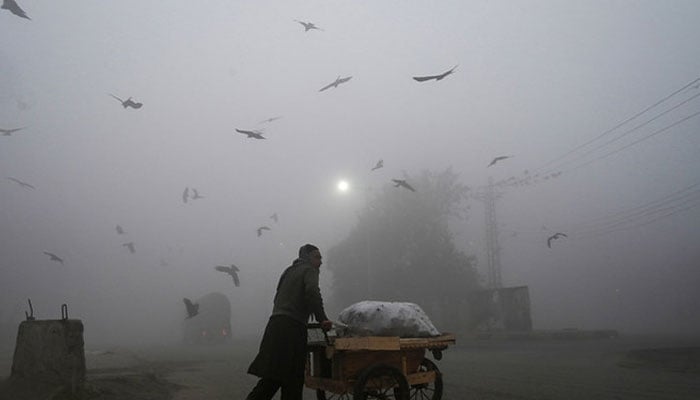Gasping for breath
An unexplainable cough, sore throat, red eyes – this is life in Lahore under the thick blanket of smog that has now become the unwanted gift of winter in Pakistan. Over the years, and partly due to inaction by authorities, Pakistan has become a perfect example for leaders to understand how unchecked economic activities pose a threat to human health. According to Human Rights Watch, air pollution in Pakistan is unleashing a devastating impact on people’s health.
The HRW says that findings by Fair Finance Pakistan, an organization working to address the impact of climate change, have uncovered the surprisingly high number of deaths caused by air pollution in the country – at least 128,000 deaths per year.
And if this was not enough, the Air Quality Life index suggests that air pollution in Pakistan shortens average life expectancy by 3.9 years. Average life expectancy in the country (66.27 years) is already lower than global life expectancy (73.16 years). For Lahore, though, experts expect even worse; they suggest that air pollution can potentially reduce life expectancy for the residents of the city by seven years.
Pakistan has consistently ignored the warnings by environment experts who keep pointing out how the country’s policies and lack of action are destroying the environment. For starters, there has been no will on the part of the government to start work on the phaseout of fossil fuels, although Pakistan is a resource-abundant country and can easily reduce its reliance on fossil fuels. Similarly, the Pakistan government rarely acknowledges how practices like waste incineration, presence of smoke-emitting factors in residential areas, etc can harm the environment. Talks are held to combat air pollution only during the onset of winter when Lahore turns into a sepia-toned city, covered in thick layers of smog. Measures taken then hardly lead to desired results. Also, a cursory look at the country’s urban expansion plans also suggests that Pakistan has no interest in fixing its ways.
For example, the razing down of green fertile land to make way for housing societies and other concrete plazas and the indescribable obsession of authorities to make signal-free corridors instead of investing in a public transportation network clearly show that Pakistan will continue to face environmental problems for a long time. Until December 12, several world leaders are in Dubai, participating in discussions held under the umbrella of COP28. This year’s conference holds significance for this has been the first time that the event’s formal proceedings have dedicated an entire day focusing on health, allowing experts to highlight the damaging effects of climate change on people’s health. Pakistan must pay attention to observations made during the event and learn how it can save its population from the hazardous effects of air pollution. Human Rights Watch also recommends the country join with other countries at COP28 in calling for a complete phaseout of fossil fuels. The people of Pakistan also have to be a little stern when it comes to the environment. Now that political parties are preparing for elections, the people must ask their leaders to discuss the climate plan with them. There is no time to waste.
-
 Leonardo DiCaprio's Co-star Reflects On His Viral Moment At Golden Globes
Leonardo DiCaprio's Co-star Reflects On His Viral Moment At Golden Globes -
 SpaceX Pivots From Mars Plans To Prioritize 2027 Moon Landing
SpaceX Pivots From Mars Plans To Prioritize 2027 Moon Landing -
 J. Cole Brings Back Old-school CD Sales For 'The Fall-Off' Release
J. Cole Brings Back Old-school CD Sales For 'The Fall-Off' Release -
 King Charles Still Cares About Meghan Markle
King Charles Still Cares About Meghan Markle -
 GTA 6 Built By Hand, Street By Street, Rockstar Confirms Ahead Of Launch
GTA 6 Built By Hand, Street By Street, Rockstar Confirms Ahead Of Launch -
 Funeral Home Owner Sentenced To 40 Years For Selling Corpses, Faking Ashes
Funeral Home Owner Sentenced To 40 Years For Selling Corpses, Faking Ashes -
 Why Is Thor Portrayed Differently In Marvel Movies?
Why Is Thor Portrayed Differently In Marvel Movies? -
 Dutch Seismologist Hints At 'surprise’ Quake In Coming Days
Dutch Seismologist Hints At 'surprise’ Quake In Coming Days -
 Australia’s Liberal-National Coalition Reunites After Brief Split Over Hate Laws
Australia’s Liberal-National Coalition Reunites After Brief Split Over Hate Laws -
 DC Director Gives Hopeful Message As Questions Raised Over 'Blue Beetle's Future
DC Director Gives Hopeful Message As Questions Raised Over 'Blue Beetle's Future -
 King Charles New Plans For Andrew In Norfolk Exposed
King Charles New Plans For Andrew In Norfolk Exposed -
 What You Need To Know About Ischemic Stroke
What You Need To Know About Ischemic Stroke -
 Shocking Reason Behind Type 2 Diabetes Revealed By Scientists
Shocking Reason Behind Type 2 Diabetes Revealed By Scientists -
 SpaceX Cleared For NASA Crew-12 Launch After Falcon 9 Review
SpaceX Cleared For NASA Crew-12 Launch After Falcon 9 Review -
 Meghan Markle Gives Old Hollywood Vibes In New Photos At Glitzy Event
Meghan Markle Gives Old Hollywood Vibes In New Photos At Glitzy Event -
 Simple 'finger Test' Unveils Lung Cancer Diagnosis
Simple 'finger Test' Unveils Lung Cancer Diagnosis




